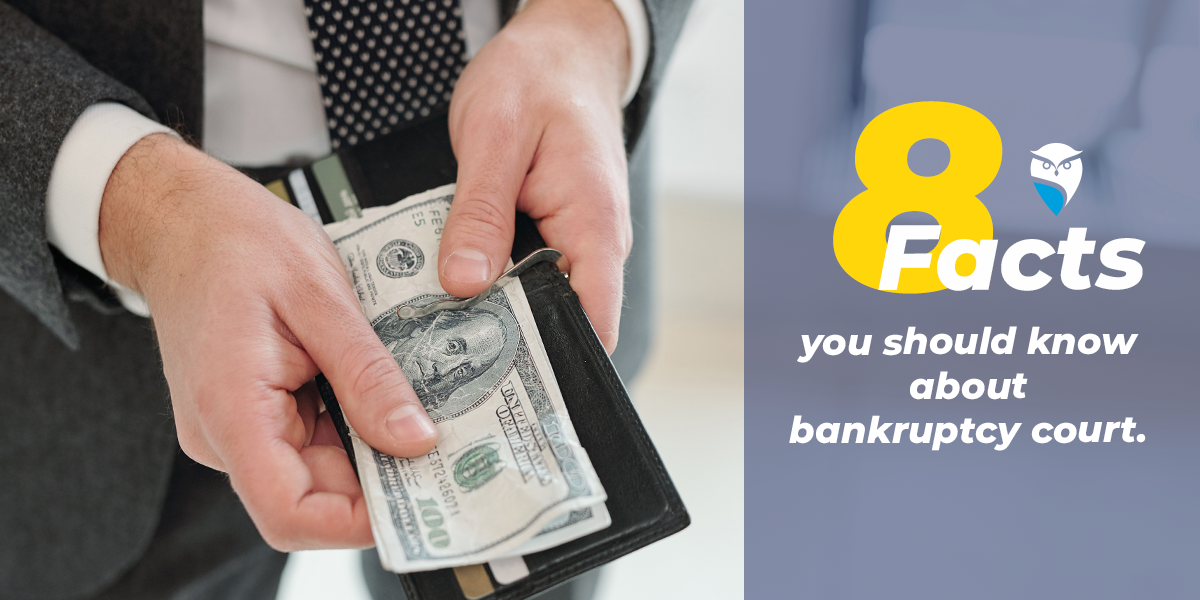
Filing for bankruptcy? Feeling confused and frustrated about the process? Well, bankruptcy is not the end of the world! You aren’t the first person to face bankruptcy and you won’t be the last. Every day, thousands of individuals/businesses file for bankruptcy to get out of a tough financial situation. This article will help you better understand how the bankruptcy court system works. So, are you ready? Here we begin.
Bankruptcy Court Fact #1: U.S. bankruptcy court refers to specialized federal courtrooms in the United States. The federal government created bankruptcy courtrooms in 1978 to settle all types of personal and corporate bankruptcy cases.
Bankruptcy Court Fact #2: Unlike most criminal, civil, and family cases that are heard in state courts, bankruptcy must be filed in a federal court. The laws that govern bankruptcy are part of federal law, not state law.
Bankruptcy Court Fact #3: There are 94 federal judicial districts throughout the United States, and each district has a bankruptcy court.
A bankruptcy case must be filed and heard in the judicial district that is the primary residence, place of business, or site of the principal assets of the filer.
Bankruptcy Court Fact #4: The case trustee, bankruptcy judge, and the bankruptcy attorney are individuals who play an important role in a bankruptcy case.
A trustee is appointed by bankruptcy courts to represent the interests of the creditors and administer the cases.
Bankruptcy Court Fact #5: A bankruptcy judge is appointed to a 14-year term by the U.S. Court of Appeals for that district. However, the appellate court has the right not to renew a bankruptcy judge’s term if it is unhappy with his or her performance. Similarly, the bankruptcy judge can choose to decline a 14- year appointment.
Bankruptcy Court Fact #6: Proceedings of a bankruptcy court are public unless a judge rules that they remain under seal, and can be accessed at a bankruptcy clerk’s office or through the Public Access to Court Electronic Records (PACER).
Bankruptcy Court Fact #7: A bankruptcy case begins with the debtor filing a petition with the appropriate bankruptcy court. The debtor is required to list assets, income, liabilities, and the names and addresses of all creditors and how much they are owed. The filing of the petition prevents, or stays, any debt collection activity against the debtor and his or her property.
Creditors get notified by the court clerk that the debtor has filed. If the court decides that there is little money available from the debtor’s estate to repay creditors, and there are no outstanding issues or disputes, the judge may grant a discharge of most debts without objection. In other words, the debtor will no longer be liable to his creditors.
Bankruptcy Court Fact #8: Most bankruptcy cases are filed under one of three main chapters of the Bankruptcy Code: Chapter 7, Chapter 11, or Chapter 13.
Under Chapter 7 bankruptcy, a trustee appointed to the case sells the debtor’s non-exempt assets (including items such as a home, motor vehicles or jewelry) and uses the money to pay the creditors.
Chapter 11 bankruptcy allows businesses and partnerships to propose a plan to pay off their creditors over time while keeping the business alive.
Chapter 13 bankruptcy allows individuals to create a plan to repay all or some of their debt within three to five years.
AppearMe will Help You Find a Qualified Bankruptcy Lawyer in Your Area
Filing for bankruptcy may seem like a complex process for many, but this procedure won’t be as difficult as you think if you have the right lawyer by your side. But you don’t want to choose just anyone to handle your case, right?
Give yourself peace of mind by hiring a bankruptcy lawyer with the help of AppearMe for Consumers.
AppearMe is a great tool for quick scheduling. In addition, the app is easy to understand at the first go. Interested? Give AppearMe a shot right now.
- Submit a Request
- Provide details on your legal matter
- Receive Proposals
- Select your bankruptcy lawyer
If you’re interested in learning more about how AppearMe for Consumers works, reach out to us at [email protected] or call us at (888) 900-3080.




